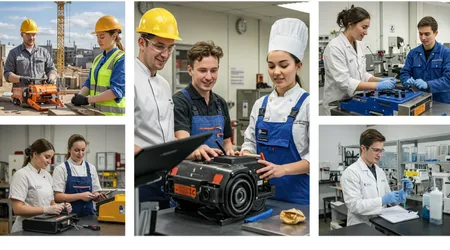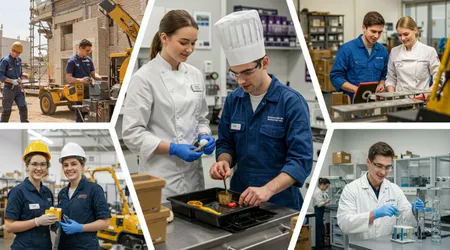Apprenticeships in the UK: How They Work and How to Apply

Apprenticeships in the UK have surged in relevance, offering a dynamic blend of hands-on training and academic learning for career starters.
In 2025, with a record-breaking £3 billion apprenticeship budget announced by the government, these programmes are pivotal for addressing skills shortages and empowering young people.
They bridge the gap between education and employment, equipping individuals with practical skills while fostering economic growth. Why settle for theory alone when you can build expertise on the job?
This guide unpacks how apprenticeships in the UK function, their benefits, and the steps to secure one, with real-world insights for aspiring apprentices.
The landscape of apprenticeships in the UK is evolving rapidly. No longer just for trades like plumbing or carpentry, they now span tech, healthcare, and creative industries.
From configuring networks in live data centres to supporting NHS operations, apprenticeships immerse learners in real-world challenges from day one.
This article draws on recent developments, like the government’s Plan for Change, to provide a clear, actionable roadmap for navigating this career path.
Whether you’re a school leaver or a career switcher, here’s everything you need to know to dive into apprenticeships in the UK.
What Are Apprenticeships in the UK?
Apprenticeships in the UK combine paid work with structured training, blending practical experience with qualifications.
You work for an employer while studying part-time, typically earning a nationally recognised certificate.
Unlike university, apprenticeships prioritise hands-on learning, embedding you in real workplace scenarios. They’re designed for everyone school leavers, career changers, or those upskilling.
++ How to Study in the UK for Free (or Cheaply!)
The diversity of apprenticeships in the UK is striking. From software development to healthcare support, options reflect modern industry needs.
In 2025, construction and tech apprenticeships are booming, driven by government reforms. You gain skills, a salary, and no student debt an appealing trifecta.
Apprenticeships last one to six years, depending on the level and industry. You’re mentored by professionals, ensuring skills align with employer demands.
This isn’t classroom theory it’s learning by doing, tailored to real-world challenges.

Why Choose an Apprenticeship?
Opting for apprenticeships in the UK means entering the workforce with a head start. You earn while learning, avoiding the financial burden of university fees.
In 2025, apprenticeships are backed by £3 billion in funding, supporting 40,000 learners via Skills Bootcamps. This investment signals their value.
Beyond finances, apprenticeships offer practical experience. Imagine configuring live networks instead of memorising textbooks.
Also read: A-Level Reforms: What Parents and Students Need to Know
They build confidence and employability, with 90% of apprentices staying employed post-training. Industries like tech and healthcare crave these skilled workers.
Moreover, apprenticeships are inclusive. They cater to diverse backgrounds, requiring minimal prior qualifications for entry-level roles.
Whether you’re 16 or 40, they provide a pathway to meaningful careers without rigid academic barriers.
Types of Apprenticeships Available
Apprenticeships in the UK span multiple levels, from intermediate to degree-level, each tied to specific qualifications.
Intermediate (Level 2) suits school leavers, equivalent to GCSEs. Advanced (Level 3) aligns with A-levels, while higher and degree apprenticeships (Levels 4–7) offer university-equivalent training.
Industries are vast construction, IT, healthcare, and creative sectors like digital marketing.
Read more: Homeschooling in the UK: Rules and Resources for Beginners
For example, a Level 3 engineering apprentice might maintain machinery, while a Level 6 cyber security apprentice protects networks. Options are tailored to 2025’s economic needs.
The government’s 2025 reforms, including 10 new technical excellence colleges, boost construction-focused apprenticeships.
This ensures training matches industry gaps, from bricklaying to sustainable energy systems, making apprenticeships in the UK a versatile career launchpad.
| Level | Equivalent Qualification | Example Roles | Duration |
|---|---|---|---|
| Intermediate (Level 2) | GCSEs | Healthcare Assistant, Carpenter | 1–2 years |
| Advanced (Level 3) | A-levels | Engineering Technician, IT Support | 1–3 years |
| Higher (Levels 4–5) | Foundation Degree | Network Engineer, Marketing Executive | 2–4 years |
| Degree (Levels 6–7) | Bachelor’s/Master’s Degree | Software Developer, Chartered Surveyor | 3–6 years |
How Do Apprenticeships Work?
Apprenticeships in the UK operate as a partnership between employers, training providers, and apprentices.
You’re employed, earning a salary, while spending 20% of your time in formal training online, in classrooms, or on-site. The rest is hands-on work.
Employers guide your development, aligning tasks with industry standards.
For instance, a data centre apprentice might troubleshoot servers under expert supervision. Training providers deliver qualifications, like NVQs or BTECs, ensuring you meet national benchmarks.
In 2025, reforms streamline this process. Foundation Apprenticeships help younger learners transition into work, building confidence.
Regular assessments ensure progress, culminating in an End-Point Assessment to certify your skills.
The beauty lies in flexibility. Apprenticeships adapt to your pace and role, whether you’re wiring circuits or coding apps. This structured yet practical approach makes apprenticeships in the UK uniquely effective.
Think of an apprenticeship like a bridge: one end rooted in learning, the other in earning, spanning the gap to a solid career. It’s a journey where every step builds real-world expertise.
How to Find and Apply for an Apprenticeship
Securing apprenticeships in the UK starts with research. Use platforms like GOV.UK’s “Find an Apprenticeship” service, which lists thousands of opportunities. Filter by location, industry, or level to match your goals.
Tailor your CV to highlight relevant skills, even from school projects or part-time jobs.
For example, a retail job shows teamwork valuable for any apprenticeship. Cover letters should reflect enthusiasm and alignment with the employer’s mission.
Applications often involve online forms, interviews, or assessment centres. Prepare by researching the company and practising common questions. In 2025, employers value adaptability and eagerness to learn over perfect qualifications.
Networking helps. Attend career fairs or engage with local businesses on LinkedIn.
For instance, Sophie, a 2025 cyber security apprentice, landed her role by connecting with a tech firm at a Sheffield job fair. Persistence pays off.
Don’t overlook smaller firms. While big names like BT or the NHS offer apprenticeships, local companies often provide personalised mentoring. Check regional job boards for hidden gems.
Challenges and How to Overcome Them
Navigating apprenticeships in the UK isn’t without hurdles. Competition is fierce, especially for high-demand fields like tech.
Stand out by showcasing practical skills build a small coding project or volunteer for relevant experience.
Balancing work and study can feel overwhelming. Time management is key. Use tools like Trello to organise tasks, as Jake, a 2024 carpentry apprentice, did to juggle site work and coursework successfully.
Some worry about lower initial pay compared to other jobs. Yet, apprenticeships offer long-term gains skills, qualifications, and job security. Focus on the bigger picture: a debt-free path to a thriving career.
Misconceptions persist, like apprenticeships being “lesser” than degrees.
In reality, 2025’s degree apprenticeships rival university qualifications, blending academic rigour with workplace expertise. Educate yourself and others on their value.
Stay resilient. Rejections are common but not personal. Seek feedback, refine your approach, and keep applying. Every “no” brings you closer to the right opportunity.

The Future of Apprenticeships in 2025 and Beyond
The outlook for apprenticeships in the UK is bright, fueled by government investment and industry demand.
The £3 billion budget and 10 new technical colleges signal a commitment to skills development. Sectors like green energy and AI are driving new programmes.
Employers increasingly value apprentices for their practical expertise. In 2025, 70% of businesses surveyed by YouGov plan to expand apprenticeship schemes, citing their role in filling skills gaps. This trend promises more opportunities.
Technology is reshaping apprenticeships. Virtual reality training, for instance, lets construction apprentices simulate complex builds safely. Such innovations make learning immersive and future-ready.
Diversity is another focus. The 2025 curriculum review pushes inclusive training, ensuring apprenticeships reflect varied backgrounds. This fosters equitable access to high-demand careers.
Looking ahead, apprenticeships in the UK will likely integrate more AI-driven learning and flexible formats.
As industries evolve, apprenticeships will remain a cornerstone of workforce development, adapting to tomorrow’s needs.
FAQs About Apprenticeships in the UK
Q: What qualifications do I need for an apprenticeship?
A: Requirements vary. Intermediate apprenticeships need basic literacy and numeracy; higher levels may require GCSEs or A-levels. Check specific listings.
Q: Can I switch careers through an apprenticeship?
A: Absolutely. Many programmes welcome career changers, offering training tailored to new industries, like tech or healthcare, with no prior experience needed.
Q: Are apprenticeships paid?
A: Yes, all apprenticeships offer a salary. Minimum apprentice wages in 2025 start at £6.40 per hour, but many employers pay more.
Q: How long does it take to complete an apprenticeship?
A: Durations range from 1–6 years, depending on the level and industry. Intermediate apprenticeships typically take 1–2 years; degree-level ones take longer.
Q: Can I get a degree through an apprenticeship?
A: Yes, degree apprenticeships (Levels 6–7) combine work with university study, leading to bachelor’s or master’s degrees without tuition fees.
This guide to apprenticeships in the UK offers a clear, actionable path for anyone eager to blend learning with earning.
With 2025’s reforms and investment, there’s no better time to explore this route.
From practical tips to real-world examples, the journey starts with a single step research, apply, and seize the opportunity to build a career that lasts.
